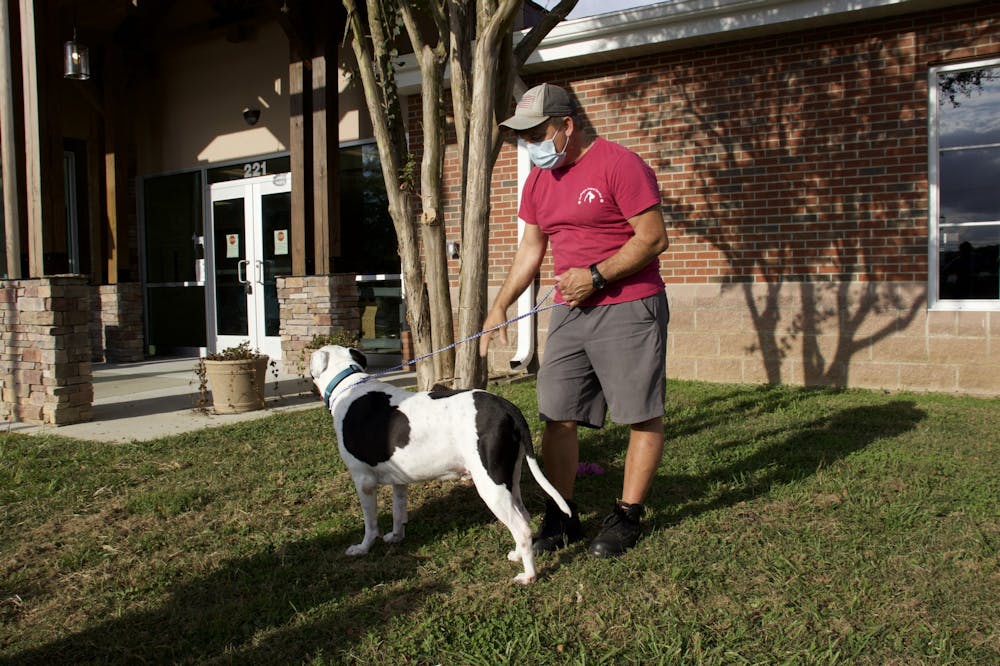Rather than to connect friends and family, Burlington Animal Services is using online video chatting in a different way — to connect people and pets.
At the start of the COVID-19 pandemic, the doors to their shelter closed, but with hundreds of pets in need of homes, Burlington Animal Services continued adoptions through virtual and physically distanced methods. This meant holding Zoom calls with pets and potential adoption candidates.
With daily tasks at the shelter slowed due to the suspension of volunteer services, BAS needed extra help caring for the animals. This help was found in community members who were willing to open up their doors to the animals through fostering.
Director of Animal Services at the Burlington Animal Shelter Jessia Arias said that the number of pets taken into foster homes is heartwarming.
“We really had an outpouring of folks from the community that were interested in fostering. The number of pets that went from the shelter and to foster homes was incredible,” Arias said.
Rather than staying at the BAS facility, 90% of their animals are currently in foster homes, whereas before coronavirus, Arias estimated that no more than 25-30% of their animals were in foster care.
This new opportunity to live in homes is a great change for rescue animals because they are getting full attention, which the shelter cannot provide due to the high volume of animals in their care.
“The pets not only get to stay in a real home environment, but they get the interaction 24/7 with a family and people,” Arias said.
Elon juniors Hope Friel and Melanie Hills started fostering Boots, a cat from the shelter, this September. Since they brought her home, Friel said they’ve seen health improvements in the cat.
“She’s become way more friendly. She also has gained a lot more weight. She was very skinny when we got her,” Friel said.
Under their care, not only have they been able to help Boots, but the cat has also helped bring the friends closer together.
“We hang out a lot more in the living room because Boots is there and everyone wants to hang out with her. She’s really fostered a much better environment,” Hills said.
This shift from in person to virtual means of communication has been the greatest change in the daily tasks of BAS.
Having to shift operations
“The biggest change and the one that’s most apparent is just not having the community at the center anymore. That means that we were getting a whole lot more communication through phone calls and email, and that’s created some challenges for us,” Arias said. “It’s been an evolving process and we’ve kind of learned as we went along and I think that our agency’s better for it at the end.”
As another precaution to prevent the spread of COVID-19, the shelter started to limit their rescues to emergency cases only, to reduce the traffic coming into their facility. In 2019, monthly rescue intakes could be seen anywhere between 300-600 animals. Now in 2020, between the months of March and May rescue intakes were below 200, with a low of 91 rescues in April. Throughout the reopening of the state, monthly rescue rates from the shelter have risen again and are back to animal intake numbers seen in previous years.
The BAS is proud of the fact that they save an average of 90% of their animals from euthanasia each month; a rate that has not been easy to maintain while only rescuing animals in emergency situations for the months of March through May. During these times, the animals rescued usually had severe trauma and required humane euthanasia so the shelter did not have as many animals being adopted.
Although the shelter is currently not accepting volunteers, people interested in helping can sign up for the Dog Day Out program. This program allows people to email the shelter to take a dog out for a few hours to go on a walk at their local park, to their home, or to just spend the afternoon with them.
“If someone wants to come and get a dog for a couple of hours to take for a walk and have an exercise buddy, that’s really wonderful for them to be able to do. And it’s wonderful for the dogs that are at the shelters so they can get out,” Arias said.
BAS is also assisting community members who have recently lost their job or are in need of financial support during this time by providing them with pet food for their animals. This way, the animals can stay fed at home and not require the services of the shelter.
While donating their supplies to others, BAS has received fewer donations themselves, as a result of the economic decline in the country. However, the shelter has claimed five grants totaling over $25,000 that have allowed them to continue their daily operations.
Right now the shelter has a list of items they are accepting as donations on their website as well as an Amazon wishlist. If people wish to donate monetarily, Burlington Animal Services accepts mail-in checks.
Until they can reopen their doors to the public once again, BAS will continue to do all they can to provide animals with safe homes while also keeping community members safe from the COVID-19.
“We look forward to the day, we can get back to normal and welcome folks back to the animal services center,” Arias said.


